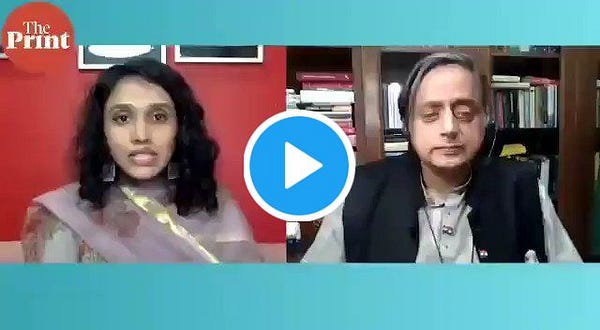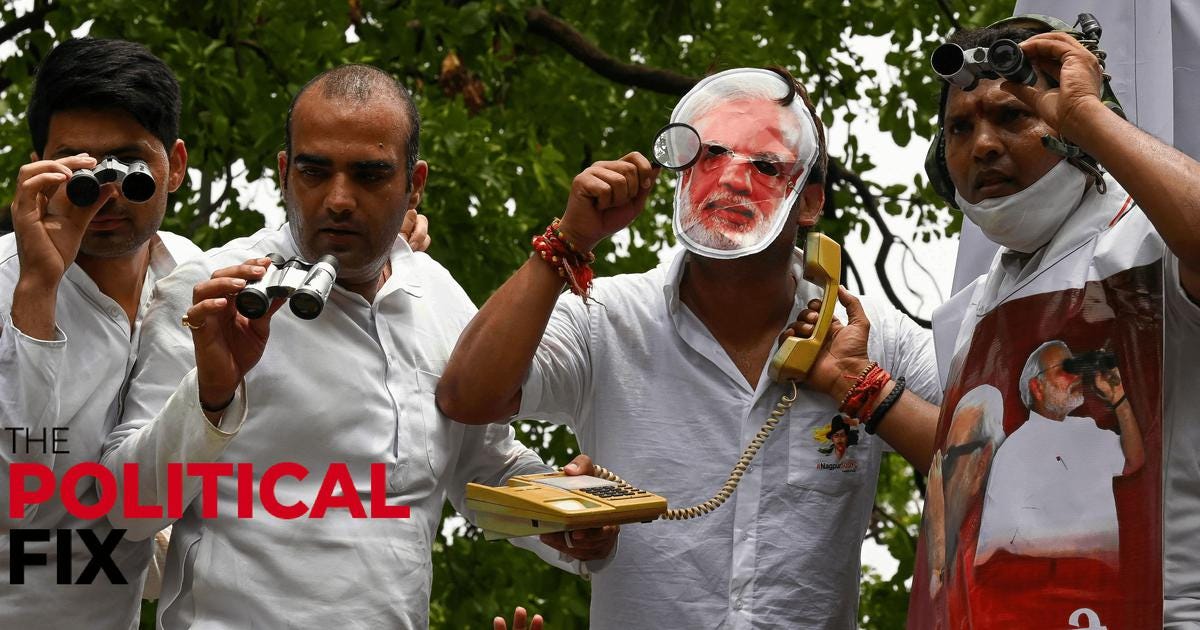The Political Fix: What does the BJP’s brazen refusal to discuss Pegasus tell us about Parliament?
A newsletter on politics and policy from Scroll.in
Welcome to The Political Fix by Rohan Venkataramakrishnan, a newsletter on Indian politics and policy. To get it in your inbox every week, sign up here.
Our small team wants to cover the big issues. That is why we are appealing for contributions to our Ground Reporting Fund. If you’d like to assist our effort, click here.
The Big Story: The (House) Floor is lava
With its brute majority in the Lok Sabha, India’s ruling Bharatiya Janata Party has rarely accorded Parliament much importance, seeing it more as a rubber stamp than a consultative space, as we discussed last year. The sordid manner in which the controversial agricultural bills were passed in September 2020 offered a prime example of this: the laws were approved in the Rajya Sabha without waiting to see if the majority of the members of Parliament was actually voting for them.
Over the last two weeks, the Opposition has sought to use the BJP’s own tactic against it.
Back in 2010, as news emerged of alleged corruption in the allocation of 2G telecom licences, the BJP along with others in the Opposition at the time decided to keep up a constant protest and prevent Parliament from functioning.
BJP leader Arun Jaitley, who has since died, defended this strategt at the time. “Parliament’s job is to conduct discussions,” he said. “But many a time, Parliament is used to ignore issues and in such situations, obstruction of Parliament is in the favour of democracy. Therefore parliamentary obstruction is not undemocratic.”
The BJP would continue to use – and defend – Parliamentary obstruction as a tactic over the 2000s. The Opposition efforts over the last two weeks attempted something similar. Yet there are key differences in how this has played out. Here are some important takeaways from the last two weeks:
a) The BJP is afraid to discuss Pegasus
The issue at hand is the alleged usage of Pegasus spyware on Indian citizens including politicians, both Opposition and ruling, as well as those connected to Supreme Court judges, an Election Commission officer, journalists, activists and much more. The Opposition has been demanding a discussion on the subject, and asking if the BJP will come clean on whether it has essentially attempted t “hack democracy”.
The use of the spyware wasn’t limited to India. Several governments around the world are alleged to have deployed it.
Should there be a discussion on Pegasus? Undoubtedly. This is one of the major issues of our time, involving everything from surveillance, the dangers posed by foreign spyware, threats to Indian democracy and violations of the privacy of Indian citizens. Parliament is the most appropriate place to discuss such questions, particularly about alleged executive excesses.
Yet the BJP has brushed off any question of a debate, insisting that the Pegasus leaks were all aimed at disrupting India’s Monsoon session of Parliament – even though the scandal has led to action by governments in France, Hungary and Morocco. Amid all this, however, the BJP has refused to say categorically that India did not use Pegasus spyware.
One might have expected the BJP to take the national security tack, saying it only used such tools to go after terrorists and criminals – just as NSO Group, the Israeli company that created the spyware, insists. Yet the Indian government has studiously avoided even acknowledging the use of spyware, and instead attempted to move on to other topics.
This suggests that the BJP would find it deeply uncomfortable to actually discuss this crucial issue, not least because any official acknowledgment might bring up vital questions regarding the fundamental right to privacy and the misuse of government machinery. Why else would the government seek to even disallow an official question on the subject in the Rajya Sabha?
b) The Opposition has managed to build unity
Prime Minister Narendra Modi’s era has certainly seen occasions on which the Opposition came together to push back against certain moves. But the cohesion among various parties over the last week is being seen as something larger.
Against the backdrop of the Trinamool Congress beating the BJP in West Bengal elections, the persistence of the farmer protests, Modi’s dip in popularity due to the colossal mismanagement of Covid-19, and the economic crisis visible around the country, these moves are being seen as an opportunity for Opposition parties to forge a tighter alliance with an eye on Lok Sabha elections in 2024.


It is not entirely political opportunism, however. Pegasus is a genuine democratic issue, and news that it was potentially used to target Congress leader Rahul Gandhi among others and even former Election Commission member Ashok Lavasa are legitimate points of concern. Even Bihar Chief Minister Nitish Kumar, an ally of the BJP, has called for a discussion.
Still, looking beyond the issue itself, there is the sense that the Opposition – which has met and tactically planned out its approach over the last two weeks – is using this issue as a platform on which to build the structures to work together over the next few years, never mind questions of who is the face and where they might actually be competitive.
c) Disruption hasn’t prevented legislation
While both of those points may suggest the BJP is on the backfoot, the one big difference from 2010 when the 2G scam was used as a weapon to wash out a Parliament session is that this time laws are still being passed.
This is partly because the BJP has a brute majority, and because it is more than willing to use “voice votes”, in which the speaker or chairman of the house has freedom to decide whether the voices in favour of a bill were louder than those against, without actually having to count. My colleague Shoaib Daniyal has written extensively about the misuse of the voice votes in Parliament in the past.
As a result, key legislation is sailing through Parliament despite Opposition disruption, and with barely any debate. The Opposition has occasionally tried to make speeches on some of these, and use the opportunity to drop in questions about Pegasus or the farm bills, but by and large, the laws have been passed without any discussion.
The New Indian Express even carried a useful chart to illustrate this:
The government has even resorted to actions like showing Opposition protests on the televisions inside Lok Sabha, to make it seem as if these have been captured by the cameras that record proceedings in Parliament, without actually putting them on the broadcast feed beamed out to citizens.
d) Nor has it made Pegasus a wider issue
Can Pegasus be compared to the 2G scam in other ways? The BJP successfully leveraged allegations in tthe 2G case – which eventually led to acquittals years later – as a way of building an anti-corruption narrative against the Congress-led alliance that permated the broader consciousness. This meant that the BJP’s efforts to stall Parliament went hand in hand with an issue that had popular resonance.
It is unclear if the question of illegal surveillance through Pegasus is having the same effect or if the Opposition has the heft to turn it into a popular issue. One all-India survey found limited awareness of the issue, with some in the Opposition too acknowledging that it will be harder to leverage the question of surveillance beyond a point.


That, however, may change if and when the government does agree to a discussion the issue – which may explain why the BJP is so insistent on avoiding it. An acknowledgment of any use of spyware at all could spark a number of reactions, including further petitions in court, discussions of access and oversight, and generally make the narrative a lot harder to control.
e) What happens with the OBC Bill?
All of these efforts to disrupt Parliament may pause mid-way through this upcoming week, the last of the monsoon session. The government indicated last week that it would be bringing a bill to clarify the powers of states to identify certain communities as backward classes to Parliament.
A Constitutional amendment passed by the Modi government in 2018 led to a reinterpretation of law earlier this year by the Supreme Court, which concluded that the power to “identify and notify socially and educationally backward classes at both the Central and the state levels will now lie exclusively with the President.”
The verdict meant that a huge number of communities identified as backward within states, but not at the national level, would lose their right to reservations in educational institutions and government appointments. According to the Indian Express, this would have impacted one-fifth of all Other Backward Classes communities in India.
This new bill from the government seeks to amend the Constitution yet again, this time preserving the central powers while also restoring the right of state governments to identify OBC communities themselves – as Opposition leaders have been demanding ever since 2018.
Constitutional amendments need support from two-thirds of those present and voting in both houses of Parliament to be passed, which means the BJP cannot rely on its brute majority. Yet the Opposition – whose demand the BJP is acting on here – are unlikely to use this as leverage to insist on a Pegasus discussion. Instead, they seem set to pause the protests to let this bill pass.
“It is our issue, because we had warned the Government in 2018 that you are committing a mistake…taking away powers of the states,” Congress leader in Lok Sabha Adhir Ranjan Chowdhury told The Indian Express. “Now they are being forced to bring the Bill… but the Government is trying to be too clever by half…we will point it out. We will not stand in the way of passage of the Bill.”
So, by the end of the week, the BJP’s legislative docket is likely to have been successful, with little debate on actual issues, passage of a constitutional amendment and not much impact of Pegasus disruption – beyond the forging of Opposition unity.
Yet Modi’s unhappiness about an Opposition leader likening BJP-pushed legislation to “papri chaat” – essentially fast food – suggests that the government does not want its utter disregard for Parliament’s consultative aspects to actually be called out or acknowledged.
Linking Out
The government finally relented on its retrospective tax efforts, which we discussed last month, taking seven long years to settle an issue that it referred to as “tax terrorism” when it was in the Opposition.
Manoj CG and Ravish Tiwari report on some of the sneaky Parliamentary tactics carried out by the BJP ahead of the August 5, 2019 effort to take away Jammu and Kashmir’s special status, only coming to light now.
I asked, two weeks ago, if the government would do a u-turn on another aspect of its vaccine policy – the 25% quota to the private sector – since many doses were going to waste. The government has, in effect, done away with the quota now.
Arunabh Saikia and Shoaib Daniyal write on how the Trinamool Congress effort to take on the BJP in Tripura may be its first attempts to go national.
Also read Arunabh Saikia’s report on why the BJP is throwing its weight behind Adityanath in Uttar Pradesh.







Can’t make this up


Thanks for reading the Political Fix. Send feedback to rohan@scroll.in.




